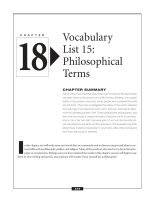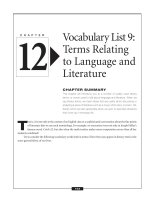Vocabulary list 9 - Terms Relating to Language and Literature
Bạn đang xem bản rút gọn của tài liệu. Xem và tải ngay bản đầy đủ của tài liệu tại đây (125.84 KB, 14 trang )
T
hat is, it is not only in the context of an English class or a sophisticated conversation about the fine points
of literature that we use such terminology. For example, we encounter irony not only in Joseph Heller’s
famous novel, Catch-22, but also when the math teacher makes more computation errors than all her
students combined!
Try to consider the following vocabulary words both in terms of how they may appear in literary texts in the
more general fabric of our lives.
CHAPTER
Vocabulary List 9:
Terms Relating
to Language and
Literature
CHAPTER SUMMARY
This chapter will introduce you to a number of widely used literary
terms, or words used to talk about language and literature. When we
say
literary terms,
we mean ideas that are useful when discussing or
analyzing a piece of literature such as a novel, short story, or poem. Yet,
literary terms are also applicable when we wish to describe situations
that come up in everyday life.
12
143
–
VOCABULARY LIST 9: TERMS RELATING TO LANGUAGE AND LITERATURE
–
145
1
3
4
2
6
5
7
89
1211
10
14
17
15
18
16
13
Across
3 using language effectively and
persuasively
4 banal, ordinary, common
7 play on words
8 maxim, adage
9 ordinary writing
13 humanization
15 incongruity, or expressing
something other than, or
opposite to, the literal meaning
16 infer
17 the use of ridicule, usually to
criticize
18 explain, interpret
Down
1 deduce, judge
2 a poem or paragraph dealing
with a single thought
5 word origins
6 model, exemplar
9 embodiment
10 using words whose sounds
suggest the meaning
11 outlook, point of view
12 talking to oneself, usually in
drama, to reveal thoughts
without actually addressing the
listener
13 short tale relating an incident
14 main character
Choose the word from the Vocabulary List that best fits into the crossword puzzle. You can check your answers
at the end of the chapter following the answers to the questions.
Vocabulary List 9: Terms Relating to Language and Literature
anecdote
anthropomorphism
archetype
aphorism
construe
deduce
epigram
etymology
infer
irony
onomatopoeia
personification
perspective
protagonist
prose
pun
rhetoric
satire
soliloquy
trite
anecdote (a·nik·do¯t)
(noun)
a short account of an interesting or humorous
incident
In order to capture classroom life for the visiting
parents at “Back to School Night,” the teacher
shared a number of comical (s)
about her kindergarten students.
anthropomorphism (ant·thrə·pə·mo˙ r·fi·zəm)
(noun)
attribution of human motivation, characteristics, or
behavior to inanimate objects, animals, or
natural phenomena
The Native American legend exhibited elements of
, as it was a bear who emotionally
narrated the tale of loss on the reservation.
archetype (ar·ki·t¯p)
(noun)
an original model or type after which other similar
things are patterned; an ideal example of a type
Shakespeare’s dramas provide a literary
that has influenced many subsequent authors
who follow the pattern his work provides.
aphorism (a·fə·ri·zəm)
(noun)
a brief statement of a truth or opinion; a saying or an
adage
The old , “Good things come to those
who wait,” proved true when after many years,
the patient boy got his wish.
construe (kən·stru)
(verb)
to explain the meaning of; interpret; to analyze the
grammatical structure of (a sentence)
The boy (d) his mother’s silence as
disappointment in his behavior.
deduce (di·dus)
(verb)
to reach a conclusion by reasoning; to infer from a
general principle; to trace the origin of
Are you able to the meaning of a word
once you are given ample context clues?
epigram (e·pə˙·ram)
(noun)
a short, witty poem expressing a single thought or
observation; a concise, clever, often paradoxical
statement or saying
The novelist began her text with a short
on the first page that truly captured the
complexity of the story that followed.
etymology (e·tə·ma·lə·je¯)
(noun)
the origin and historical development of a word’s
forms, meanings and usages
Students were asked to trace the of the
word, looking in particular for its earliest usage.
infer (in·fər)
(verb)
to conclude or reason from evidence, premises, or
circumstance; to hint or imply
Given the circumstances, we may that
the young mother’s motive for putting her baby
up for adoption was indeed honorable.
irony (¯·rə·ne¯)
(noun)
the use of words to express something different from,
and often opposite to, their literal meaning; a
literary style employing such contrasts for witty
effect; incongruity between what might be
expected and what actually occurs
The of his name, “Tiny,” became
apparent when I saw the seven-foot-tall man
for the first time.
–
VOCABULARY LIST 9: TERMS RELATING TO LANGUAGE AND LITERATURE
–
147









